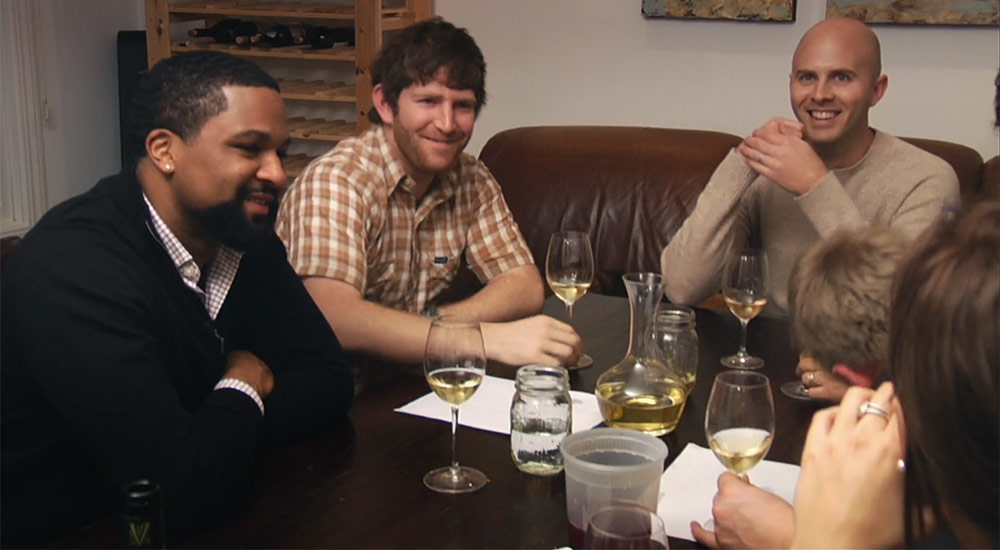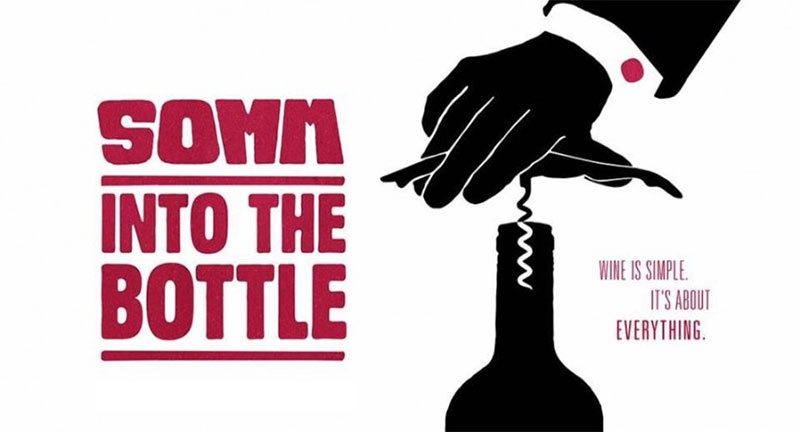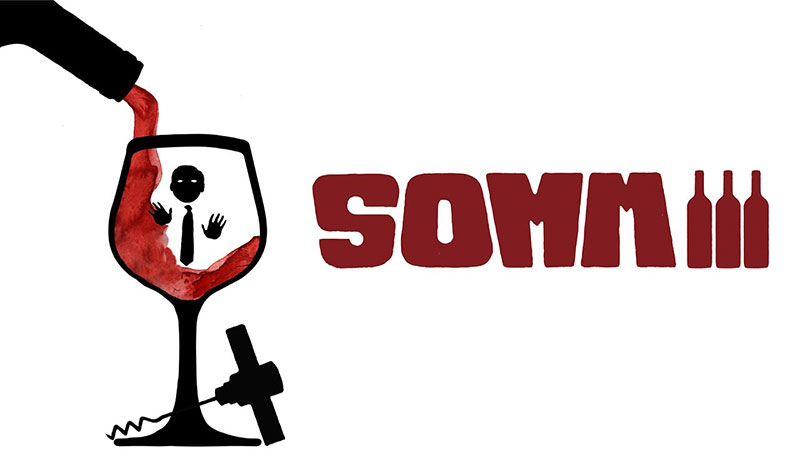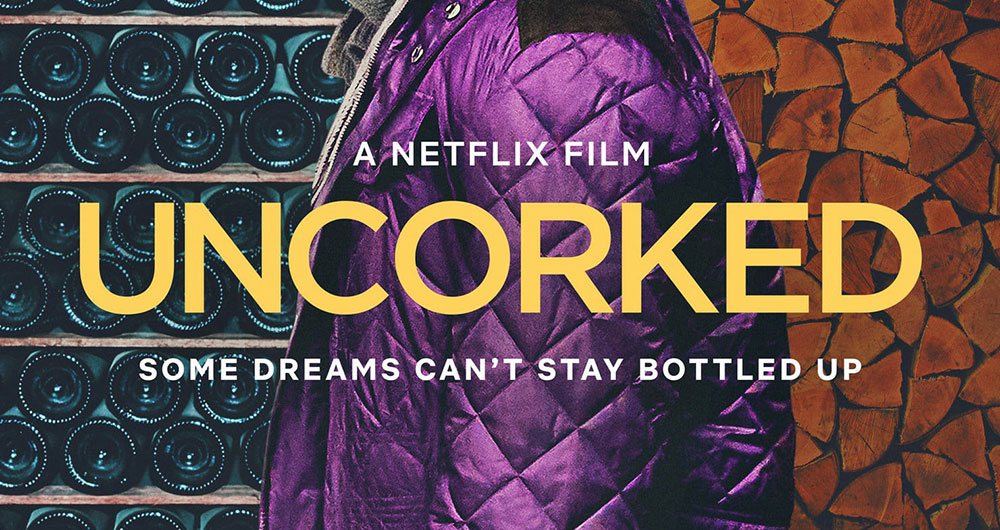There are few if any films that have had such a profound impact on the wine world than the original SOMM film from 2012.
I’m reminded of this constantly such as when I was leading a tasting for a couple of people a few days ago and a guy in the group asked me, “I suppose you’ve seen SOMM? What a crazy thing that is.” And this wasn’t a one-off. It happens with pretty much everyone I meet who is a happy wine drinker.
So yes, despite being a decade old now, it still comes up very often in conversation. Do note that it’s not SOMM II: “In Search of Plot” nor SOMM III: “Because what else we gonna do?” that people mention. It’s just the first film as that was the real game changer for the popular wine culture on so many fronts.
MANY things have come to pass in the time since this cadre of wine servers came out of nowhere and gave us all a glimpse into the “zany” world of the sommelier. Due to that and the fact I’ve only reviewed the second and third films here, but not the original, I took a moment to sit back, pour up a glass and re-watch this original film as I hadn’t since it first came out and it made me realize a great many things. Some were things that I’d remembered incorrectly and others where those I missed. But, oh so many were simply cringeworthy things to watch given all that’s happened since 2012 with the Court of Master Sommeliers (CMS) Americas.
A wine film learning about wine
The first thing to note is that the director, Jason Wise didn’t seem to know much about wine when he set about making this film. Various scenes fall into all the old tropes of what someone thinks a wine film should be: jazz music, slow shots of wine being poured from different angles, young men taking long walks in vineyards for some reason. There’s a good reason we’ve seen these shots ad nauseum and that’s because for as much fun as it is to drink, wine is inherently boring on film.
This is important to note as it gives way to Wise being enthralled by his subjects (he was initially friends with Brian McClintic, which is how he got the idea for the film) and he goes to great lengths to show that to the viewer and little else. This is perfectly encapsulated by star chef, Michael Mina’s comment at the very beginning about how he thinks that ever since “rockstar chefs” have come to be, it’s high time for “rockstar sommeliers” to be recognized.
So, it’s this fixation and worship of these unknown guys: Brian McClintic, Dustin Wilson, Ian Cauble, and Dlynn Proctor by Wise upon which the film is thereby constructed.
If you were to re-watch it like I did, would you immediately notice anything odd about the film?
You should in that there isn’t any appearance of a single woman until minute 7:14 and it’s not a woman in the sommelier profession, but the girlfriend of Ian Cauble who comments on how difficult it can be to have a sommelier in one’s life as they’re just so, so committed to the work. Going along, the next woman to appear is the wife of Dustin Wilson with similar issues.
In fact, there are exceedingly few women who appear in the film except as wives and girlfriends (the dismissive “WAGs” in British parlance) in these submissive support roles to the men. The two that do appear in talking head clips who are wine professionals are Advanced Sommelier, Margaux Pierog (who appears to have left being a sommelier completely to work in distribution) and then one, single female Master Sommelier (amongst countless male Master Sommeliers) named Emily Wines, but more on her in a bit.
The only one to appear outside of them is in a scene which defines the entire crux of the film and its attitude towards women which is that of The Guys sitting around practicing their blind tasting with Eric Railsback, a sommelier in San Francisco at the time, pouring for them. It was where Ian explained his “freshly-cut garden hose” tasting note and with this viewing, it made me realize how incredibly annoying his tasting notes were in general.
You may not have realized it, but there is a woman in this male-dominated scene as well. Her name is Liz Dowty and she’s an Advanced Sommelier, as everyone in that scene was at the moment it was shot, in other words, they were complete equals. The reason that you probably don’t remember her is that her main screen time is when the guys are making fun of her for not knowing a Lord of the Rings reference and she’s ridiculed (I mean, seriously?)
And that’s it.
You don’t get to hear how she tastes or any of her thoughts on the wines or on being a sommelier. She’s just the butt of a joke but the shots are cut in this strange manner that it seems like they were zoomed in post-production in order to intentionally cut her out, leaving just her hand sometimes; this vestigial trace of a woman. The message is clear, “Women are just silly things in this wine world. The men, they know where it’s at. Now let’s try to keep her from distracting from the ‘amazing’ journey of The Guys.”
This is picked up again at the end in a less-glaring, but still a telling choice by Wise where, at the MS exam, suddenly another examinee, Sabato Sagaria (who would eventually go on to pass) appears out of nowhere and yet, still no women.
We’re then told that Sabato didn’t manage to pass on that try, but wait, what’s that? It seems you can see snippets of women in the post-examination space and yes, it does happen, women take the Master Sommelier exam, too! But there’s no way any of this comes through as Wise’s film focuses on men, emphasizes men, and pushes the male aspect of the Court of Master Sommeliers in a manner never seen previous.
Here come the rockstars
The correlation between the release of the film and a sudden interest in the sommelier profession was easy to see. There was a 20% rise in applicants in 2013 alone (the year after it had been released) and it continued to grow with increasing membership in Guildsomm as a study reference but also the amount of people suddenly claiming to be sommeliers despite never having worked in a restaurant.
The overall effect was that for those at the Master Sommelier level in the US, there was a god-like power vested upon those who had attained the title. While there were some who stayed humble to their service-industry roots (this was even more so in the European chapter), others saw themselves as some new kind of trend setter within the restaurant world, the rockstars coming after the rockstar chefs.
There’s something a bit amiss with this premise from the beginning. Sommeliers have not made any of the wines they’re serving. All they’ve done is organize and sell them. Do we ever talk about “rockstar” librarians? Not that I’m terribly aware of but the context is similar.
It didn’t seem to matter though as sommeliers became freewheeling, devil-may-care in their attitudes–if males. For a time, sommeliers became bigger than anyone else in the wine industry and PR companies went out of their way to invite them on trips to wine regions around the world for their perceived influence, primarily on social media. Under the surface however, was a seething world of inequality, workplace harassment and even abuse that was left unaddressed until it was far too late.
The Trifecta of Tumult
The first big issue to be known to the public was in 2018 with the Master Sommelier examination cheating scandal which was so over the top that it’s even earned its own Wikipedia page. In brief, the intensity of people wanting to achieve this title reached such outlandish proportions that during the tasting portion of the exam, Master Sommelier at the time, Reggie Narito passed the names of some of the wines being tasted blind to an unknown number of candidates taking the exam, starting with those who he had been personally training. It was un-shocking that this allowed a record 24 people to then pass the exam. It was also un-shocking that the CMS nullified the results and people had to re-sit. And then of course, Narito was rightfully expelled from the Court.
But as in all things to besot the CMS Americas during the 20-teens, no one had any idea how long this had been going on as it was only found out due to someone who had received the cheat notes notifying the testing authorities. Had that not been the case, there would have been no fallout afterwards.
Following this, in 2020 with the Black Lives Matter protests sweeping across the US, the CMS Americas seemed to find it very difficult to issue a simple statement of support until far into the protests happening and even then, it was a wobbling attempt at best. This was coupled with Tahiirah Habibi’s viral Instagram post stating her outright repulsion at having to refer to a Master Sommelier as Master LastName during the classes and exams. That should have been weird to anyone (and the European chapter never adopted this) but for Habibi, who is black, it’s easy to see how it was simply so far out of line as to be wildly inappropriate and yet, the boys’ club of the CMS Americas seemed to see nothing wrong about it until they had their faces rubbed in it all over social media.
But the real battleship-sinking moment was the sexual harassment scandal at the end of the 2020. There were 21 women who came forward to tell the New York Times about the actions of male Master Sommeliers which ranged from alleged inappropriate interactions to unwanted sexual advances to outright rape. Sadly, much like the cheating scandal, there are probably far more who didn’t come forward. Finding no allies or any system in place for them to report their claims, some who had been victims simply checked out of the sommelier line of work given everything they were up against.
It should come as no surprise it got to that point given that already in 2019, there were abuse problems in the sommelier world and yet people still seemed willing to brush them under the rug. Even if turning to other wine people but outside the sommelier community, women had trouble finding help as exemplified by well-established wine writer Alice Feiring telling one woman who had come to her about the sexual assault of Anthony Cailan to basically just “suck it up” as women had been told to do for decades.
All of this was a crushing blow, not because of what was revealed but due to the scope of it. For example, everyone had been hearing rumblings for years about what a sexual predator Geoff Kruth was and yet, nothing was done about it. Matt Stamp (founder of Compline bar) had had sexual relations with two women who he was administering tests to while a Master Sommelier and his biggest punishment was just having to sit out on giving exams for a while. Others had even less punishment and were still allowed to give exams, but not to those they had had relationships with or had made unwanted sexual advances upon. The sommeliers were gods, those gods were men, and if you wanted to get in, you had little choice but to go along with it.
These issues have been present for a long time as Madeleine Thompson stated in the New York Times article, “Sexual aggression is a constant for women somms. We can’t escape it, so we learn to live with it,”. There was never a reckoning for this behavior and these problems in the sommelier community and Wise’s film SOMM simply reinforced it via how sommeliers were seen. He ultimately enabled and normalized these problems in the same manner that Trump enabled the Far Right in the United States, given a voice and foundation to lurid tendencies.
The net result is that the formal sommelier education fell far and hard and who knows how long it will take to put the pieces back together.
A new board was elected to the CMS Americas and they’re working to fix things as they can. They have a lot of work cut out for them and are now headed by Emily Wines, that single female MS to have appeared in the SOMM film. I do hope that CMS Americas as well as Guildsomm (which Kruth severely tainted by being its founder and director until the sex scandal) can come back as they’re both worthwhile organizations to give a bar for people in the service industry to aspire to.
The repercussions
All this said, no criminal charges have been filed against anyone in the CMS Americas, although it sounds like they could have been. Instead, it’s been a fully private matter but in this, here has been less than ideal transparency.
The board stripped the titles of six Master Sommeliers: Bob Bath, Fred Dame, Fred Dexheimer, Drew Hendricks, Joseph Linder, and Matt Stamp. That was a long-overdue start.
The most prominent in this list was Fred Dame, who was included in all three SOMM films to date. This was poor judgment on the part of the filmmaker as it infers that excellence would be aspiring to being Fred Dame and he pretty much always came across as an unabashed tyrant in the films so there’s no surprise he was a problem. And then of course there are two others from the film, Geoff Kruth who resigned before a ruling could be handed down upon him and then Reggie Narito who was kicked out for the cheating scandal.
As the sex scandal fallout happened, Brian McClintic resigned his title officially out of disgust for what had happened to the Court. He’s built up a large following outside of being a Master Sommelier so this probably didn’t mean that much for him and I respect Dustin Wilson a great deal more as he stayed in with a desire to try and change things. Dustin has also been very vocal about the issue which he knows is risky given that the new Code of Conduct was actually a step backwards in that they don’t allow anyone to publicly criticize the Court now which is something out of the Putin Playbook, not an organization trying to redeem itself.
The Unnamed
What’s more interesting though is that while the removal of six MSs made news, there was an additional group who were discretely “disciplined”. It was never revealed who nor in what form this discipline took place. Additionally, those who came forward about the bad actions of the Master Sommeliers, never heard about any resolution either.
Short of kicking someone out, one of the few things the CMS Americas can do is stop someone from being an instructor of others. There are requirements that need to be maintained in order to keep instructing, but if looking at the members’ list on the CMS Americas website, you’ll note that anyone whose name isn’t in bold isn’t authorized to instruct. This was indicated by an asterisk, but how it was displayed was changed recently.
If you go back 15 years, you’ll notice that they’re all men and there are 11 of them. Like I said, while there are various reasons why someone might not be up to the current requirements to instruct, Devon Broglie is one of those who was very much doing exams up until the scandal broke and he was found to be having an improper sexual relationship with a woman taking the exams who he was tutoring.
Edit: Nearly a year after publishing this article the CMS-A has reinstated a number of those in this 11 (such as Broglie) but, in what appears to be an ongoing MO, they’ve made no statement as to why and again, they’ve never made any mention of who was “disciplined” but not kicked out of the CMS-A. This has obviously frustrated those who were victims in this whole affair and it does little to encourage anyone to give the organization yet another chance that they’ve yet to show they deserve.
How about that reckoning?
Perhaps this is a moment for the CMS Americas to finally and fully clean the air, reach out to the victims in this scandal and work to rebuild instead of just sweeping under the carpet? As history has shown, whether it’s, toxicity, sexual harassment or even something extreme like Russian aggression, just pretending like it isn’t there, doesn’t make it go away. Sadly, the SOMM film and its subsequent enduring popularity only reinforced a masculine view of the sommelier world, erasing any female contribution and thus contributed to a culture that enables this egregious sexist behavior by making it part of popular culture.
Clearly, the bad behavior within the CMS Americans had been going before the SOMM film, but its release and the proceeding explosion of interest in the sommelier profession essentially said, “what you’ve been doing, that’s all just fine, just look at everyone who wants to be part of this glamourous life”. As a documentary filmmaker, Wise failed to ask harder questions, and to show a broader perspective. Maybe the film is a reflection of a mainstream view of wine at the time, or perhaps it’s his own views as while it was clear to see that women were very much involved in the CMS exams back then and in the professional wine trade at large, a clear decision was made that kept them largely ignored and out of sight. This only worsened longstanding problems.
It’s hard to say how many of these problems are going to be fixed in the short term, but it’s safe to say that the last decade, in a post-SOMM world, has been completely awful to women in the field and a reckoning is long overdue. Changing the toxic culture that permeated the wine world and that was furthered by the SOMM film is not only necessary but inevitable. And the sooner the CMS Americas realizes it and starts working in a genuine, meaningful and transparent way to be more inclusive, dropping their cloak and dagger approach of the last few years, the better.
For anyone who isn’t part of these changes that absolutely must come to pass, then they’re still part of the problem and need to take a hard look at themselves.
You’re reading a free article on Hudin.com.
Please consider subscribing to support independent journalism and get access to regional wine reports as well as insider information on the wine world.




